“Before menopause, women have a lower risk of heart
disease than men. However, as women age and their
oestrogen levels fall, their risk of cardiovascular…”.1
Umbrella
What may the Menopause and Cardiovascular Disease Umbrella include?
Depending on the Source (DotS) this Umbrella may include:
- Cardiovascular Conditions
- Cardiovascular Disease/s (CVD/CVDs)
- Cardiovascular Disorders
- Diseases/Disorders of the Heart and Blood Vessels
- Diseases/Disorders of the Heart and Circulatory System
- Heart Disease/s
- Heart and Circulatory Disease
- Stroke
Cardiovascular Diseases
What are cardiovascular diseases (CVDs)?
DotS the definition of CVDs may vary. In Cardiovascular Diseases (CVDs): What Are Cardiovascular Diseases? the World Health Organization’s (WHO) definition is:
- Coronary heart disease – a disease of the blood vessels supplying the heart muscle
- Cerebrovascular disease – a disease of the blood vessels supplying the brain
- Peripheral arterial disease – a disease of blood vessels supplying the arms and legs
- Rheumatic heart disease – damage to the heart muscle and heart valves from rheumatic fever, caused by streptococcal bacteria
- Congenital heart disease – birth defects that affect the normal development and functioning of the heart caused by malformations of the heart structure from birth; and
- Deep vein thrombosis and pulmonary embolism – blood clots in the leg veins, which can dislodge and move to the heart and lungs”.2
Age

As women age, does their risk of CVD increase?
The (Australian) Jean Hailes for Women’s Health (JH) note:
“Before menopause, women have a lower risk of heart disease than men. However, as women age and their oestrogen levels fall, their risk of cardiovascular disease increases”.3
Menopause and Cardiovascular Risk Factors
What are menopause and CVD risk factors?
In Menopause and Cardiovascular Risk Factors: Does Menopause Increase A Woman’s Risk of Heart Disease and Stroke? the American Heart Association’s Go Red for Women elaborate on:
- Age at the time of menopause. Women who reach menopause before age 45 have a significantly higher risk of coronary heart disease…
- The cause and timing of menopause. Menopause caused by surgical removal of both ovaries at an early age can lead to a higher risk of cardiovascular disease…
- Estrogen. Levels of estrogen, which helps keep blood vessels relaxed and open, start to decline markedly as menopause approaches…
- Hot flashes and night sweats. Hot flashes and night sweats are the most common menopause-related symptoms and can last up to 10 years….
- Depression and sleep problems. In some studies, depression and sleep disturbances were linked to an increased risk of heart disease…
- Increased visceral fat. This type of fat, in the abdominal cavity near vital organs, is associated with a higher risk of cardiovascular disease and cancer…
- Cholesterol levels and metabolic syndrome risk. These cardiovascular risk factors appear to increase with menopause beyond the effects of normal aging…”.4
Hot Flushes and Night Sweats
Is there an association between menopausal vasomotor symptoms (VMS) i.e., hot flushes and night sweats and CVD?
In Vasomotor Menopausal Symptoms and Risk of Cardiovascular Disease: A Pooled Analysis of Six Prospective Studies – Conclusion the authors conclude:
“Severity rather than frequency of VMS (hot flushes and night sweats) was associated with increased risk of CVD. VMS with onset before or after menopause were also associated with increased risk of CVD”.5
Prevention
Is CVD preventable?
In What Is Menopause? Perimenopause, Menopause and Postmenopause – Postmenopause: Heart Health the JH note:
For example:
- Eat a healthy and nutritious diet
- Do regular exercise
- Maintain a healthy weight
- Don’t smoke
- Limit alcohol intake”.6
Know Your Numbers
What numbers do women (and men) need to know?
In Know Your Numbers They Could Just Save Your Life the (United States) Go Red for Women elaborate on:
 “Talk to your healthcare provider today to learn about your Blood Pressure, Cholesterol, Blood Sugar and BMI (Body Mass Index). Your heart depends on it”.7
“Talk to your healthcare provider today to learn about your Blood Pressure, Cholesterol, Blood Sugar and BMI (Body Mass Index). Your heart depends on it”.7Heart Check
What may a heart check include?
In What Is Menopause? Perimenopause, Menopause and Postmenopause – Postmenopause: Heart Health the JH also note:
WISEWOMAN Program
What is the WISEWOMAN program?
Your Country may have a program similar to the (United States) WISEWOMAN Program. In WISEWOMAN Frequently Asked Questions (FAQs): What Is the WISEWOMAN Program? the (United States) Centers for Disease Control and Prevention (CDC) elaborate on:
What services does the WISEWOMAN program fund?
The CDC explain:
Health Care Provider
What if I think I have CVD or I have a family history of CVD?
If you think you have CVD or you have a family history of CVD, it may be in your best interest to choose to talk to your health care provider about this
In Menopause and Cardiovascular Disease Risk Go Red for Women note:
Health Topics A-Z
Where may I find Health Topics A-Z related to Menopause and Cardiovascular Disease?
In Health Topics A-Z you may find:
Links
Where may I find Links related to Menopause and Cardiovascular Disease?
Your Country may have Links similar to:
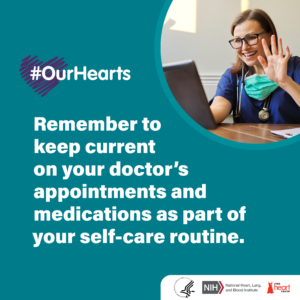
Links
This Links List to third party websites is neither comprehensive nor exhaustive. Inclusion on this Links List does not imply endorsement or recommendation. Non-inclusion on this Links List does not imply non-endorsement or non-recommendation. Third party websites are not under the control of Meno Martha International Menopause Directory. Third party websites may contain explicit medical images and/or sexual references. Please read Meno Martha International Menopause Directory’s Links Policy before proceeding to a Link. Please contact Webmaster if you experience a problem with a Link.New or Updated
- Factors Impacting Women’s Cardiovascular Health Across the Lifespan
- February Is American Heart Month
- The Menopausal Transition Period and Cardiovascular Risk
- The Slowly Evolving Truth About Heart Disease and Women [09 February 2024]
- Video Series-2023: Menopause and Heart Disease
- Videos & Podcasts: Videos – Interviews: Cardiovascular Disease In Women
- Askearlymenopause.org [Ask EM] [+ Video: What Is Early Menopause?]
- Aspirin Use To Prevent Cardiovascular Disease US Preventive Services Task Force Recommendation Statement
- BMS TV
- BMS TV: Coronary Heart Disease (CHD)
- BMS TV: Menopause – Weight Gain, Nutrition and Lifestyle
- CVS Health Screenings
- Cardiovascular Disease Risk Factors and Heart Attack Warning Signs In Women
- Cardiovascular Diseases (CVDs)
- Cardiovascular Health
- Cardiovascular Health: Risks & Causes
- Cardiovascular Risks May Be Worse for Thinking, Memory Skills In Middle-Aged Women
- Deciding About Hormone Therapy Use
- Doing These 8 Things May Greatly Lower Risk for Heart Disease and Stroke
- Factors Impacting Women’s Cardiovascular Health Across the Lifespan
- Find A Menopause Practitioner [United States and Other]
- Find An AMS Doctor [Australasian Menopause Society i.e. Australia and New Zealand]
- Find Your Nearest BMS Menopause Specialist [British Menopause Society]
- Flavonoids Are A Flavorful Way To Boost Heart and Brain Health
- Getting Serious About Heart Health
- Goredforwomen.org [Go Red for Women, United States]
- Guidance on Menopausal Hormone Therapy
- Heart Health for Women
- Heart Palpitations
- Herheart.org
- Hot Flushes and Night Sweats Linked To 70 Per Cent Increase In Cardiovascular Disease
- How Menopause Impacts Your Health
- Improving Heart Health At Midlife and Beyond Could Lower Future Risk of Stroke, Dementia
- Is Menopause Making Me Put on Weight? No, But It’s Complicated
- Joint Position Statement By the British Menopause Society, Royal College of Obstetricians and Gynaecologists and Society for Endocrinology on Best Practice Recommendations for the Care of Women Experiencing the Menopause
- KnowDiabetesbyHeart
- Know Your Numbers
- Later Years (Around 50 Years and Over): Menopause and Post Menopause Health – After the Menopause: Cardiovascular Disease
- Later Years (Around 50 Years and Over): Menopause and Post Menopause Health – Early and Premature Menopause [+ Video: Menopause Only Happens In Your 50s]
- Later Years (Around 50 Years and Over): Menopause and Post Menopause Health – Menopause [+ Video: Menopause]
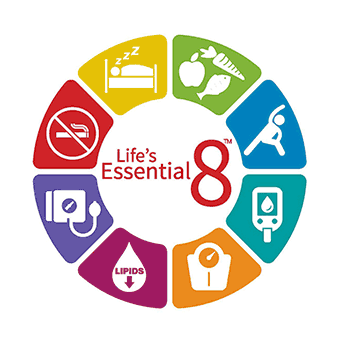 Let’s Talk About Perimenopause
Let’s Talk About Perimenopause- Life’s Essential 8
- Looking After Yourself
- Mayo Clinic Minute: Are You Getting Enough Sleep for Your Best Heart Health? [+ Video Courtesy: Mayo Clinic News Network]
- Mayo Clinic Minute: Menopause and the Heart Connection [+ Video Courtesy: Mayo Clinic News Network]
- Mayo Clinic Minute: Signs of Coronary Artery Disease, How To Reduce Your Risk [+ Video]
- Mayo Clinic Minute: What Women Need To Know About Stroke [+ Video Courtesy: Mayo Clinic News Network]
- Mayo Clinic Minute: Women’s Heart Attack Symptoms Vary [+ Video]
- Mayo Clinic Q and A: Perimenopause Transitions and Concerns
- Menopausal Hormone Therapy, Heart Disease and Stroke
- Menopause
- Menopause
- Menopause Map: Downloadable Resources – My Personal Path Print Tools: Questions for Your Health Care Provider

- Menopause Map: Downloadable Resources – My Personal Path Print Tools: Symptom Tracker
- Menopause Mindfulness: Living Your Best Work-Life Through the Menopause Transition
- Menopause Patient Information [Videos] 2. Talking To Your GP About Menopause
- Menopause Preparedness Toolkit Video Series: Common Conditions Associated with Menopause and Midlife
- Menopause Preparedness Toolkit Video Series: Lifestyle Tips for Menopause Wellness
- Menopause Preparedness Toolkit Video Series: What Is Menopause?
- Menopause Preparedness Toolkit: A Woman’s Empowerment Guide
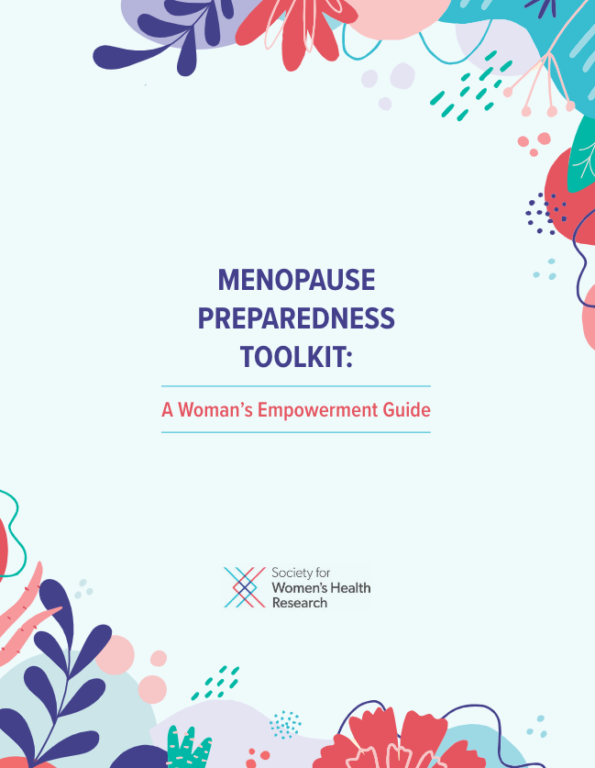 Menopause Symptoms: Mayo Clinic Expert Outlines Hormone and Nonhormonal Therapies
Menopause Symptoms: Mayo Clinic Expert Outlines Hormone and Nonhormonal Therapies- Menopause Treatments: What Works, What Doesn’t
- Menopause and Cardiovascular Risk
- Menopause: Ensuring A Tranquil Transition
- ‘Menopause: Misinformation and Management’ World Menopause Day 2023
- Menopause: Things You Can Do
- Menopause: Understanding the Changes and Finding Relief | Dr Susan Davis | The Proof Podcast EP 256
- Million Hearts
- Mymenoplan.org [My Menoplan, United States]
- National Center for Complementary and Integrative Health: Cardiovascular Disease
- Navigating Menopause: Expert Insights and Solutions | Dr Susan Davis | The Proof Podcast EP 245
- Nonhormone Treatments for Hot Flashes and Night Sweats [17 July 2023]
- People Who Follow These 8 Heart Health Metrics May Live Years Longer
- Perimenopause
- Perimenopause
- Q&A: Health Changes During Menopause Associated With Increased Cardiovascular Risk
- Read My Lips
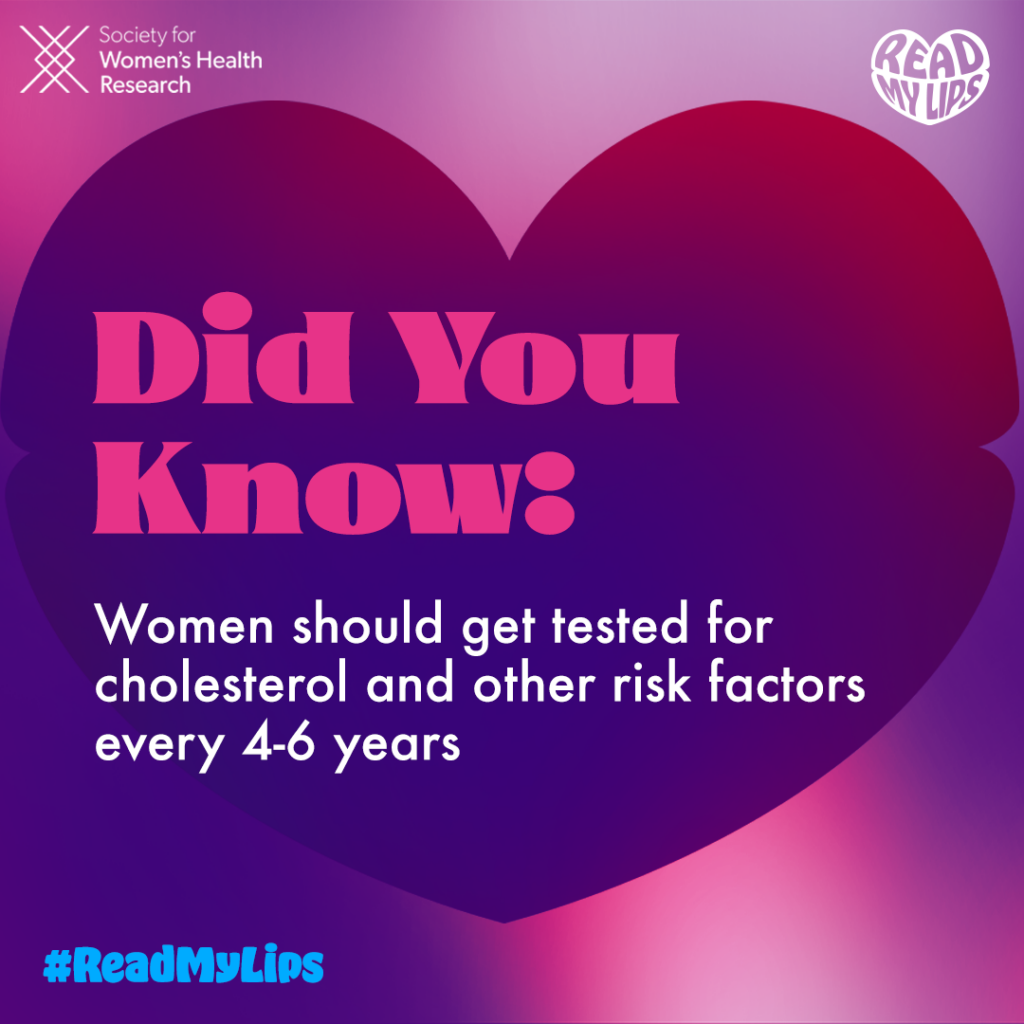
- Risk Factors
- Staying Healthy During and After Menopause
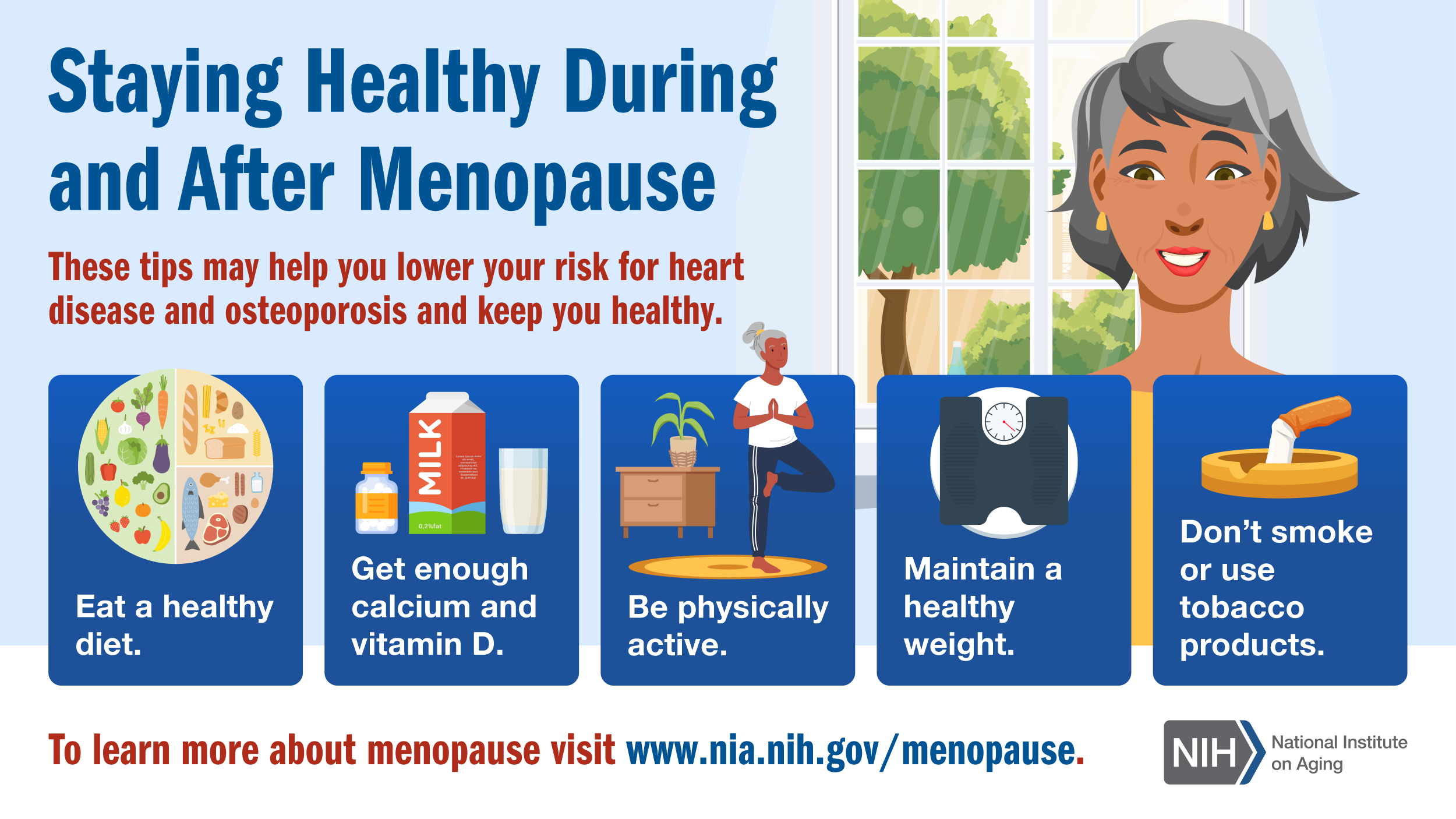
- Smokefreewomen [United States]
- Stroke
- Taking It To Heart: Addressing Cardiovascular Disease In Women
- The Connection Between Menopause and Cardiovascular Disease Risks
- The Heart Truth [National Heart, Lung, and Blood Institute, United States]
- The Menopausal Transition Period and Cardiovascular Risk
- The Truth About Menopause Supplements | Dr Sarah Berry [Video]
- Therapy for the Effects of Menopause
- Tips To Help Manage Menopause Symptoms
- Using Natural Therapies In the Menopause Transition – Webinar
- Video Series-2023: Menopause and Heart Disease
- Video Series-2023: NAMS 2023 Nonhormone Therapies Position Statement for Bothersome Menopause Symptoms
- Video Series-2023: New FDA-Approved Nonhormone Option for the Treatment of Hot Flashes
- Video: Leslie Cho, MD, Discusses CV Risks, Benefits of Menopausal Hormone Therapy
- Videos & Podcasts: Videos – Interviews: Cardiovascular Disease In Women
- Videos and Podcasts: Videos – Interviews: A Simple Approach To Menopause: The Menopause Quick Six (www.MQ6.ca)
- Videos and Podcasts: Videos – Interviews: Heart Disease, Risk Factors of Developing Heart Disease, and Can I Take Hormones?
- Webinars: Previous – Cardiovascular Disease
- Webinars: Previous – Reproductive Milestones Across the Lifespan and Cardiovascular Disease Risk In Women
- Webinars: Previous – The Heart of the Matter
- What Doctors Wish Patients Knew About Menopause
- What Is Cardiovascular Disease?
- World Heart Day [29 September]
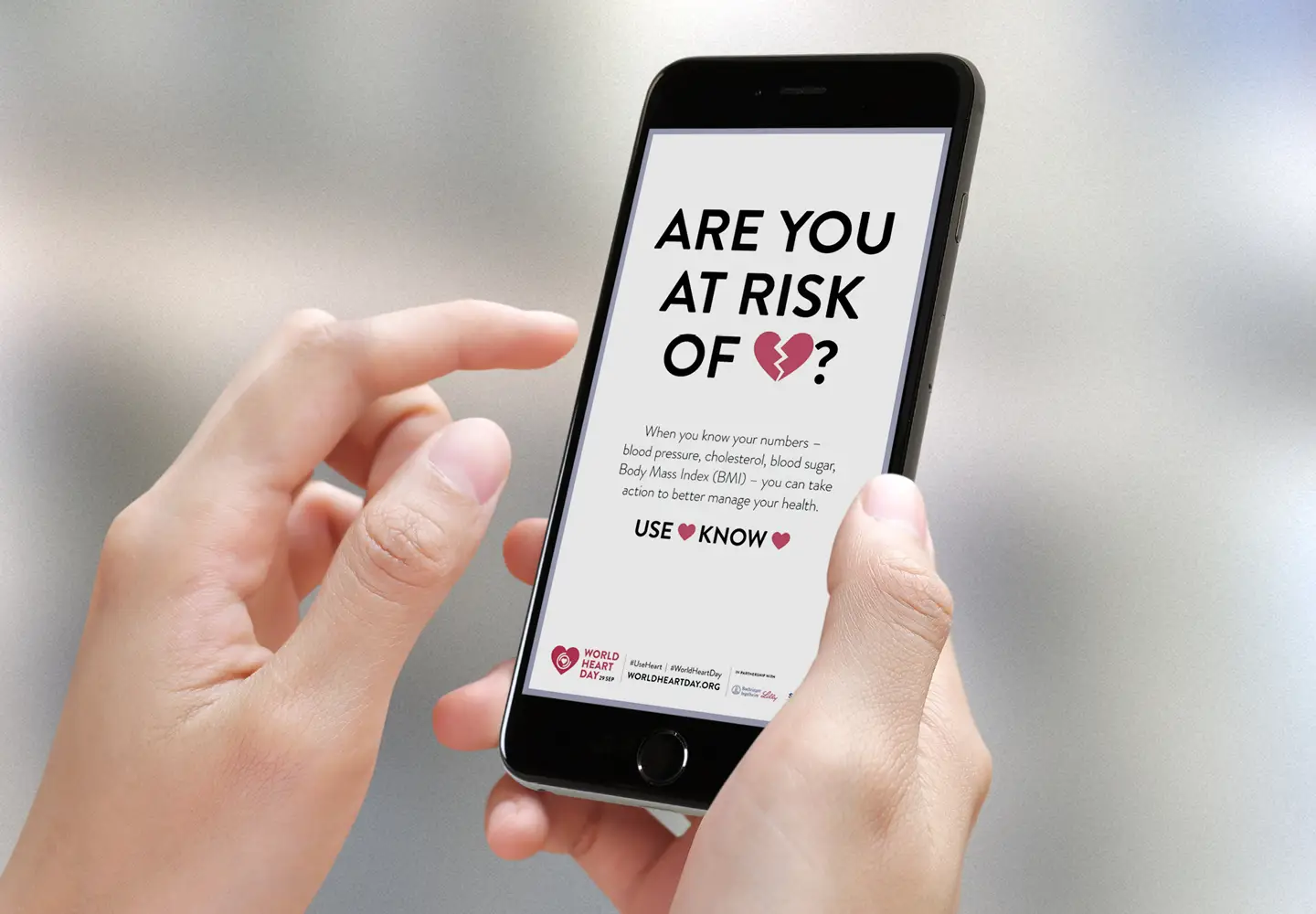
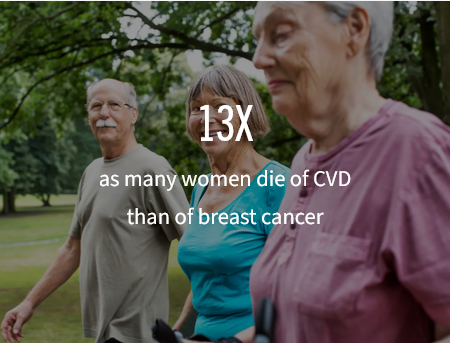
- World Menopause Day

- World Menopause Day: Patient Information Leaflet – Cardiovascular Disease: What Women Need To Know [Multiply Languages]
- World Menopause Day: The IMS White Paper
- World Stroke Day
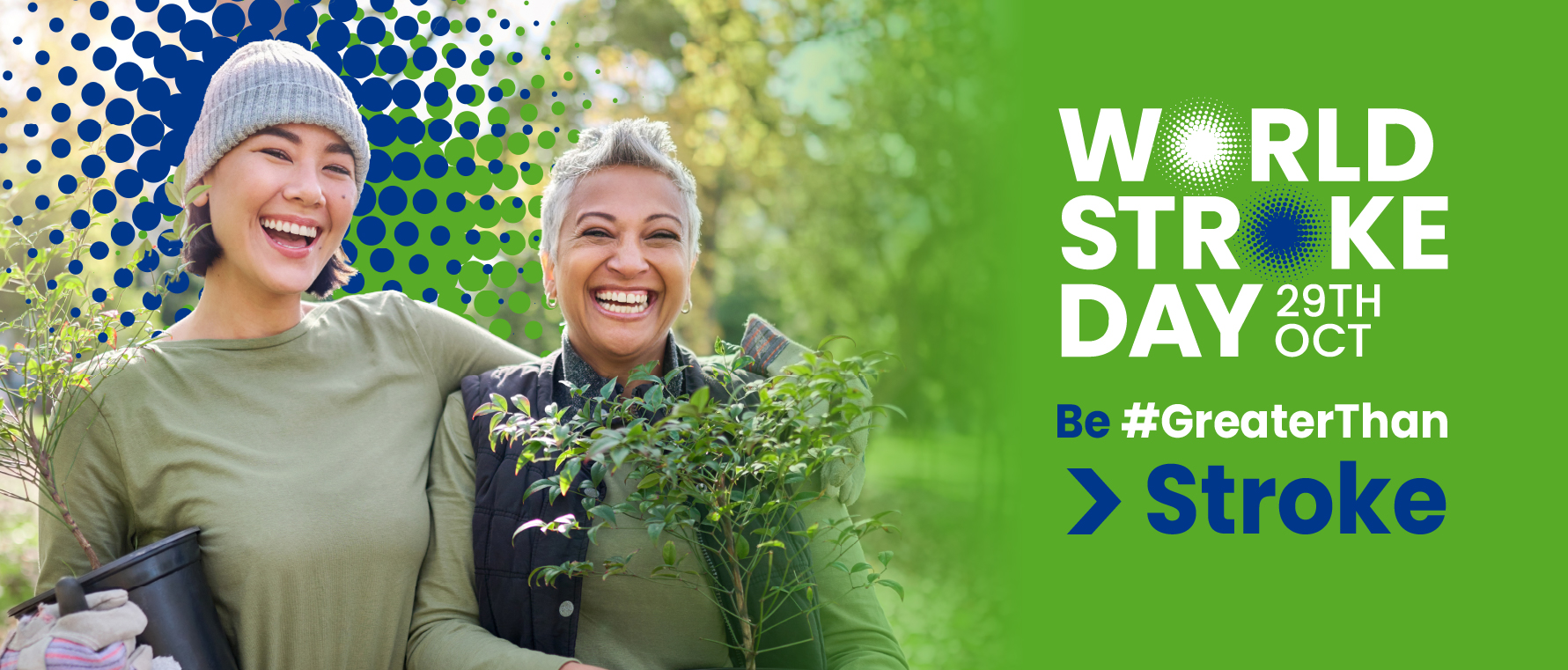
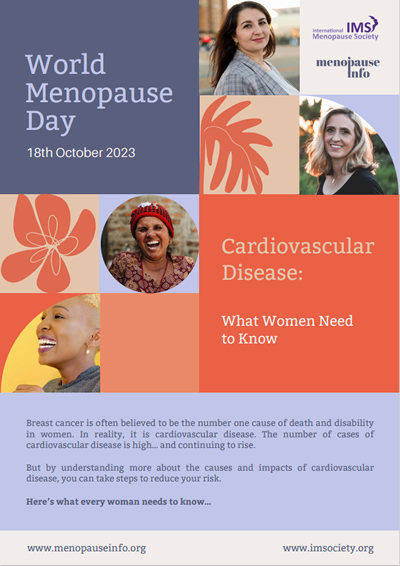
Sources
Where may I find the Sources quoted?
You may find the Sources quoted at:
Sources
- What Is Menopause? Perimenopause, Menopause and Postmenopause – Postmenopause: Heart Health. Last Updated: 07 December 2023 | Last Reviewed: 19 August 2022. Jean Hailes for Women’s Health https://www.jeanhailes.org.au/health-a-z/menopause/about-menopause Accessed: 15 January 2024
- Cardiovascular Diseases (CVDs): What Are Cardiovascular Diseases? 11 June 2021. World Health Organization https://www.who.int/en/news-room/fact-sheets/detail/cardiovascular-diseases-(cvds) Accessed: 15 January 2024
- What Is Menopause? Perimenopause, Menopause and Postmenopause – Postmenopause: Heart Health. Last Updated: 07 December 2023 | Last Reviewed: 19 August 2022. Jean Hailes for Women’s Health https://www.jeanhailes.org.au/health-a-z/menopause/about-menopause Accessed: 15 January 2024
- Menopause and Cardiovascular Disease Risk. Last Reviewed: 27 July 2021. Go Red for Women https://www.goredforwomen.org/en/know-your-risk/menopause/menopause-and-cardiovascular-risk Accessed: 15 January 2024
- Zhu, D., Chung, H-F., Dobson, A. J., El Khoudary, S. E., Crawford, S., Mishra, G. D. eta al. Vasomotor Menopausal Symptoms and Risk of Cardiovascular Disease: A Pooled Analysis of Six Prospective Studies – Conclusion. 22 June 2020. https://www.ajog.org/article/S0002-9378(20)30664-5/pdf Accessed: 15 January 2024
- What Is Menopause? Perimenopause, Menopause and Postmenopause – Postmenopause: Heart Health. Last Updated: 07 December 2023 | Last Reviewed: 19 August 2022. Jean Hailes for Women’s Health https://www.jeanhailes.org.au/health-a-z/menopause/about-menopause Accessed: 15 January 2024
- Know Your Numbers They Could Just Save Your Life. Go Red for Women https://www.goredforwomen.org/en/know-your-risk/know-your-numbers Accessed: 15 January 2024
- What Is Menopause? Perimenopause, Menopause and Postmenopause – Postmenopause: Heart Health. Last Updated: 07 December 2023 | Last Reviewed: 19 August 2022. Jean Hailes for Women’s Health https://www.jeanhailes.org.au/health-a-z/menopause/about-menopause Accessed: 15 January 2024
- WISEWOMAN Frequently Asked Questions (FAQs): What Is the WISEWOMAN Program? Page Last Reviewed: 09 December 2021. Centers for Disease Control and Prevention https://www.cdc.gov/wisewoman/faqs.htm Accessed: 15 January 2024
- WISEWOMAN Frequently Asked Questions (FAQs): What Services Does the WISEWOMAN Program Fund? Page Last Reviewed: 09 December 2021. Centers for Disease Control and Prevention https://www.cdc.gov/wisewoman/faqs.htm Accessed: 15 January 2024
- Menopause and Cardiovascular Disease Risk. Last Reviewed: 27 July 2021. Go Red for Women https://www.goredforwomen.org/en/know-your-risk/menopause/menopause-and-cardiovascular-risk Accessed: 15 January 2024



